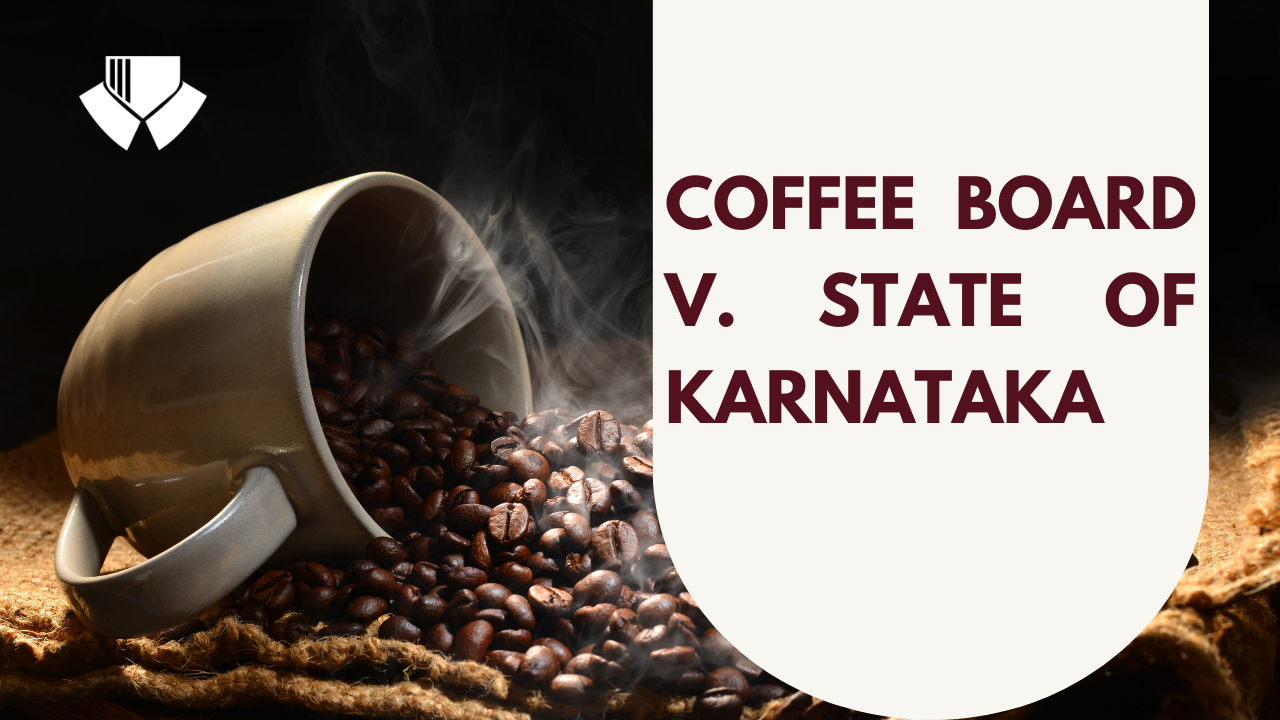This case analysis is done by Nidhi, a law student of Institute of Law, Kurukshetra University, Kurukshetra.
Citation: ILR 1989 KAR 3506, 1990 (3) KarLJ 507
Court: Karnataka High Court
Bench: Justice M R Jois, J. S R Babu
FACTS :
The Coffee Board reported a total turnover of Rs. 46,23,87,356.93 for the fiscal year 1974-1975. This turnover included sales within the state and export sales. The Board claimed a deduction of Rs. 22,41,37,445 for export sales but was challenged by the assessing authority, which determined that goods worth Rs. 1,07,88,750 were exported through the State Trading Corporation of India (STC) and did not qualify as direct export sales.
As a result, the assessing authority imposed a 10% tax rate on this particular turnover as an inter-state sale, not eligible for tax benefits. The Assistant Commissioner of Commercial Taxes finalized the assessment on December 2, 1978, categorizing the turnover into two parts: Rs. 7,08,281.70 as turnover from coffee sales covered by C and D forms, taxed at 3%, and Rs. 1,07,88,750 as turnover from coffee sales to the STC, taxed at 10%.
The Coffee Board appealed, arguing that sales to the STC should be considered export sales and thus exempt from taxation. They also claimed they didn’t have enough time to provide the necessary forms for the exemption. However, the Deputy Commissioner disagreed, stating that the sales to the STC weren’t export sales since there was no direct contract with foreign buyers, and they had sufficient time to submit the required forms.
The Karnataka Appellate Tribunal upheld the Deputy Commissioner’s decision, stating that the transactions between the Coffee Board and the STC, as well as between the STC and foreign buyers, were separate and not covered by tax law. The Tribunal also rejected the argument that the transactions constituted a sale by the transfer of ownership documents after the goods left India’s customs borders.
In response, the Coffee Board filed a revision petition to challenge the Tribunal’s ruling.
ISSUES:
- Whether the coffee supply facilitated via the State Trading Corporation (STC) to foreign buyers qualified as an export sale, thereby being eligible for exemption from taxation?
- Whether the dealer had been provided with adequate opportunities to submit C forms for export transactions conducted through the STC?
CONTENTIONS:
By the Petitioner (the Coffee Board):
- The petitioner’s counsel argued that Section 5(1) of the Central Sales Tax Act,1956 contains two components. The first component relates to a sale that directly leads to export, while the second component pertains to a sale resulting from the transfer of title documents after the goods have crossed the customs frontiers. The petitioner contended that, in this case, the transfer of title to the goods occurred only after they had crossed the customs frontiers. Therefore, the second component of Section 5(1) should apply, making this an export sale exempt from taxation under Article 286 of the Constitution.
- It is contented by the Coffee Board that the contract with the State Trading Corporation (SCT) explicitly outlines the terms related to the transfer of goods and that the sale occurred through the transfer of ownership documents, particularly bills of lading. So, this sale qualifies as an export transaction within the scope of the second part of Section 5(1) of the Central Sales Tax Act,1956.
- Article 286(1)(b) of the Constitution of India prohibits the imposition of taxes on sales or purchases of goods occurring during the import or export of goods outside the territory of India by any state law. The Constitutional (Sixth Amendment) Act of 1956 empowers Parliament to lay down these principles for determining when a sale or purchase qualifies as taking place during import or export. Section 5(1) of the Central Sales Tax Act,1956.
Supporting Authorities:
Addressing the interpretation of Section 5(1) of Central Sales Tax Act,1956 in Supreme Court Cases.
- The Ben Gorm Nilgiri Plantations Co. v. Sales Tax Officer case
emphasized that an intention to export, followed by actual export, and an obligation to export, either statutory or contractual, are prerequisites for such transactions.
- Tax Officer The Coffee Board v. Joint Commercial case
focused on the definition of “sale in the course of import or export of goods,” underscoring the need for a domestic exporter and a foreign importer, with a contractual relationship initiating the export process.
- Mod. Serajuddin v. State of Orissa case,
similar to the present situation, examined the implications of involving the STC in export-import contracts and the impact on actual export sales. It was held that the STC was the exporter, and the notional sale to the STC was subject to taxation by the State.
- The Binani Bros. (P.) Ltd. v. Union of India case,
which dealt with imports, clarified that even if the purchase of goods from foreign buyers led to the import of goods, the sale within India remained distinct and taxable. Import licenses did not absolve the dealer of tax liability.
By Respondent:
- The transaction is between a statutory organisation and a public sector undertaking and, therefore, the dealings between them cannot be doubted to say that there is anything shady in their transaction even at this distance of time it would be reasonable therefore to permit the petitioner to avail of the opportunity to produce the C and D forms within one month from today and claim the benefit thereof before the assessing authority.
- The petitioner pointed to specific clauses in the contract between them and the State Trading Corporation (STC) to support their argument. These clauses indicated that the transfer of property in the goods happened after the goods had crossed the customs frontiers of India.
- The petitioner also argued that even though the goods were sold to the STC, they remained the owner of the goods until the goods entered the export trade by crossing the customs frontiers. As a result, the sale between the petitioner and the STC should be exempt from tax since it was intricately connected to export.
Cited Authorities:
They cited the Supreme Court decision in
- National Tractors v. Commissioner of Commercial Taxes, Bangalore,
to support this position. However, they acknowledged that this decision had been explained differently in the case of ,
Murarilal Sarawagi v. State of Andhra Pradesh. They emphasized that for a sale to be considered an export sale, the goods must reach a foreign destination, involve an Indian exporter and a foreign importer, and adhere to the principles of Section 5(1) of the Central Sales Tax Act,1956. They contended that, in this case, the STC was only an Indian buyer and exporter, failing to meet the criteria for an export sale.
The petitioner cited a decision by the Madhya Pradesh High Court in
- Hindustan Steel Ltd., Bhilai Steel Plant v. State of Madhya Pradesh . However, it was argued that this decision aligned with the Supreme Court’s position in National Tractors’ case, which was subsequently addressed differently in Murarilal Sarawagi’s case. Given the Supreme Court’s clarification in the latter case, the petitioner believed that the transactions with the STC did not qualify as export sales exempt from taxation under Article 286 of the Constitution.
- On the second aspect of the matter, the petitioner contended that both the Tribunal and the authorities had unreasonably denied their request to produce C and D forms to claim a concessional tax rate. They argued that the denial was unjustified, as they had raised the contention that their transactions were export sales exempt from taxation after careful consideration and legal advice. The petitioner emphasized that the dealings involved a statutory organization and a public sector undertaking, indicating transparency in their transactions. They requested an opportunity to submit the C and D forms within one month to claim the tax benefit before the assessing authority.
JUDGEMENT
In the judgment, the revision petition is partially granted. The Tribunal’s decision on coffee sales to the State Trading Corporation not qualifying as exports, and thus not exempt from taxation, is upheld. However, the assessment order for a specific turnover of Rs. 1,07,88,750 is invalidated, and it’s sent back to the assessing authority for reevaluation based on the petitioner’s C and D forms. The petitioner can submit these forms within a month for a reduced tax rate. In all other aspects, the assessment order confirmed by the appellate authority and the Tribunal remains unchanged. The petition is partly allowed, with the concessional tax rate considered by the assessing authority.


